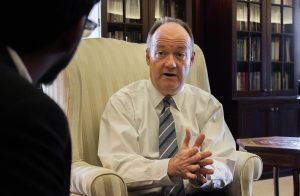Plaintiffs in a class-action lawsuit against Georgetown and 16 other universities filed a new motion in federal court on Dec. 16, alleging that former President John J. DeGioia created a list of wealthy or legacy students to be admitted to Georgetown.
The lawsuit, which has been in litigation since January 2022, alleges that Georgetown and the other defendants violated federal antitrust laws by colluding to raise the price of attendance through an illegal consideration of a student’s financial circumstances in admissions decisions. The universities named in the suit are former members of the 568 Presidents Group, a group of schools which came together in the 1990s to create a standard formula for financial aid awards.
In a statement to the Voice, a university spokesperson denied any wrongdoing and maintained that Georgetown does not consider applicant wealth or family donations in the admissions process.
“Per university policy, Georgetown does not knowingly solicit or accept gifts from individuals who have or may soon have a relative or person of close personal interest applying for admission to the university,” the spokesperson wrote.
In one section of the Dec. 16 filing, attorneys detail the ways in which Georgetown has allegedly continually practiced preferences for children of wealthy donors despite claiming to engage in “need-blind” admissions.
The filing states that in a speech at a September 2015 meeting at the Economic Club of Washington, then-President DeGioia allegedly alluded to the fact that he considered applicants whose parents are donors as superior applicants, telling the audience that Georgetown has “never met a marginal child of a big donor.”
If the plaintiffs’claim that Georgetown favors certain wealthy students in the admissions process is found true, then Georgetown and other members of the 568 Presidents Group will have engaged in illegal price fixing.
“Georgetown’s participation in the 568 Presidents Group was consistent with our ongoing work to ensure that a student’s economic background does not limit their ability to attend Georgetown,” a university spokesperson wrote to the Voice.
The suit, which is a class-action, claims damages of $685 million to over 170,000 current and former students who were harmed by the alleged price fixing.
Ted Normand of Freedman Normand Friedland LLP, co-lead attorney for the plaintiffs, wrote in a statement that the schools’ collusion allowed them to grow their endowments by a combined $165 billion before the 568 Presidents Group disbanded.
“The schools thereby saved themselves, and cost their students, hundreds of millions of dollars in aid,” Normand wrote.
The new filing references a “Special Interest Policy” written by Dean of Admissions Charles Deacon, which the filing claims codified the university’s practice of giving preference to wealthy students. The policy allows the university to “consider special circumstances in the admission of some qualified candidates who might not be admitted competitively,” including ways in which the university may benefit by developing an association with the family.
The filing then claims that this policy was most clearly implemented by DeGioia in a yearly “President’s List” of around 80 applicants per year, which included applicants’ names and their parents’ donation history. DeGioia allegedly often wrote “Please admit” at the top of this list. While DeGioia reviewed the family’s financial contributions, the filing alleges “his review did not even include the applicant’s transcript, or teacher recommendations, or personal essays.”
Plaintiffs provided an example of one of the students on this “President’s List” whose parents DeGioia supposedly met at the Allen & Co annual conference in Sun Valley, Idaho, a gathering for some of the world’s wealthiest individuals. The suit alleges that Georgetown initially deferred the student, but after months of “communications” between DeGioia and the applicant’s father, DeGioia placed the student on the President’s List, and they were admitted.
“Asked why he put this applicant on the President’s List, President DeGioia implausibly claimed he did so because the student had ‘overcome obstacles’—namely, that the parents had been divorced,” the suit says.
This most recent filing comes as Georgetown grapples with calls to end legacy and donor preferences in admissions, as well as implementing class-conscious admissions. According to the Wall Street Journal, students with legacy status are two times more likely to get into Georgetown than non-legacy applicants. Georgetown also has one of the wealthiest student bodies in the country.
Students at Georgetown have intensified the campaign against legacy admissions over the past year.
A student group, Hoyas Against Legacy Admissions, has released a petition in 2023 calling on Georgetown to end legacy admissions that has garnered over 1100 individual and 38 student group signatures. Since then, students have continued to lobby the university, and some testified in front of the D.C. Board of Education to end legacy admissions at all private universities in D.C.
“Admissions to our university should not be a pay-to-play scheme,” Darius Wagner, organizer with Hoyas Against Legacy Admissions and incoming student body Vice President, wrote in a statement to the Voice. “If the university refuses to change, we must demand better.”
Correction: The article originally listed the Allen & Co conference as taking place in Sun Valley, Ohio, instead of Idaho.






